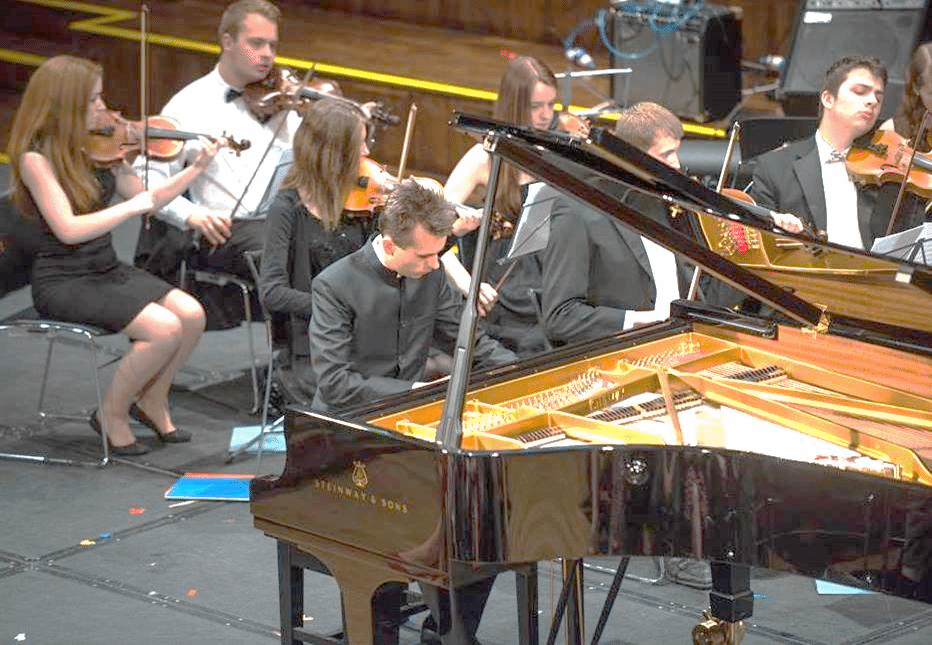James Campion, twenty-three, so far the youngest international teacher at GDUFS, accepted the interview from GDUFS English News. He has been teaching at GDUFS since September 2014, after he completed his MA in Linguistics at Lancaster University. He said, “My classes are very boring, as I don’t think I am an interesting person.” Despite this, he has gained two reputations: the best dressed teacher and a very fun teacher, as well as receiving the 2015 Model International Teacher Award. Definitely he is popular among students. But how does he identify himself and how does he look at things in China? Let’s know more about him!
Q: We heard that you played the piano in a band when you’re a university student. So it’s quite hard to imagine that you majored in Linguistics and got your BA & MA degrees in Linguistics at your university. Why did you choose Linguistics?
A: For most of my life, I wanted to be a music teacher. I planned to study music at university. I always focused on the piano, on music, and I always listened to music and played the piano both at home and school. As I grew up, music became a huge part of my life. And it seemed to be a default subject choice. In the UK, we have a qualification called A-Levels, which you study for two years before you go to university. You choose four subjects that you want to study and those subjects determine what degree you do at university. I chose music, but I also enjoyed English at school and I was good at it. So I chose music, English language, English literature and another subject to study.
Actually, two different things happened which determined what I studied at university. One was the 2008 global economic crash. With the recession that followed, jobs in music were one of the first things to disappear. And I don’t think anybody should go to university simply to study something they enjoy, but they should study something that they enjoy and can also benefit your career. The second thing was that my A-Level English language teacher is the most inspiring teacher I have ever met. He was truly passionate about what he taught and what he studied. I don’t like the word “passionate”, because I think it is overused when talking about subjects. But for him, I would use it, because his life is his subject. He taught very effectively in my class, especially me, and I developed such an amazing interest in the English language from this. However, my two interests never competed with each other, but always sat comfortably side by side. I studied Linguistics at university, but I also went home and played the piano for two hours every day. Besides, I played the keyboard in a progressive rock band.

Q: You used to have hip-length long hair, didn’t you?
A: In the UK, a huge part of the way of life or our freedom of speech is our individuality. This contrasts China, which seems to place more emphasis on the concept of “one nation”. There are a lot of differences between China and the UK. We are not obligated to conform to the preferred image that everybody should be like. Many sixteen and seventeen year-old boys and girls want to look different from others, so they grow their hair or wear different clothes. For me, I was curious about what it would be like to have long hair and a big beard, so I grew them both. As you can see from the hair and progressive rock music, I am a bit of rebel. I am not the mainstream. I like standing out and being different, not conforming to what the mass majority of people believe. I prefer going my own way.
Q: Could we ask why you are always in a suit?
A: I think dressing professionally makes you more professional. Many of my students ask me, “why are you wearing a suit; aren’t you hot?” My answer is, “Well, yeah. But I would be hot even if I was wearing nothing.” I genuinely teach better class when I am looking and feeling professional.

Q: Have you ever been to China before you began working here? And how did you like it?
A: Actually I took part in a summer camp organized by Lancaster University and I came to visit GDUFS in September 2012. We spent three weeks at GDUFS, having Chinese classes, visiting different parts of the city, and so on. We did a lot of things in the afternoon and the evening. It’s like a cultural experience. GDUFS and Lancaster University have a lot of cooperation, like the summer camp. In my first year at Lancaster University, I lived in a flat with three Chinese girls. Over that year, we talked about everything, and we often discussed China. Sometimes we talked all night, about Chinese food, history, geography, culture, politics…everything. They told me so much about China. And I grew so interested in this country. So when I saw the heard that there would be a trip to China, I knew it would be an incredible experience. When we were on the summer camp, I remember walking around GDUFS with one of my friends, saying to ourselves, “You know, I could really see myself teaching here!” It was a goal for me at that time.
Now, recalling those memories, the things happened in that month in 2012 and my memories from last year have just blended together. But I could tell you my feelings which I will never forget. I truly felt a sense of cohesion in terms of culture and nationality. The first place we went to was Building Seven, where there is a flag for the country of every student and teacher working here. Just walking around, the atmosphere was fantastic. But at Lancaster University, although there are also lots of international students, there’s no such cohesion there. It’s a very inspiring feeling being at GDUFS.
Q: From your perspective, what is the highlight in the education of a foreign language?
A: The students are the highlight. For me, the most rewarding aspect of being a teacher is to help people achieve and learn something. Most of the time when I explain some difficult concepts in English and the students understand, it can’t be more rewarding from that. It is even more impressive for a foreign teacher because I have the challenge of having to find more accessible way to explain something, as I cannot switch into the students’ native language like the Chinese teachers can.
When there are competitions like speaking contests, writing contests, drama contests that my faculty have, I am often asked to judge them, or just go along and watch my students perform. I think these events are hugely beneficial. As a teacher, the relationship with students shouldn’t just be within the classroom, it should be everywhere. The role of the teacher has to extend beyond the classroom. (Q: Like friends?) No, definitely not friends. In fact, becoming friends with students is a dangerous thing. I think that is a line which competent, responsible teachers should never cross. There is an important, professional difference there. But seeing students outside the class through working with them and being able to help them in their real lives are all key parts of being a competent, responsible teacher.
Q: I think there are many differences between the Chinese teaching system and the British teaching system. Have you watched a BBC documentary, which explored how British students react to Chinese teachers? What did you think of it?
A: Yes, I watched it when I was back at home in the summer. I thought it was a fantastic documentary.
My only criticism of the documentary was that the three parts of the documentary focused too much around the idea of “It’s a competition between the two systems and one team has got to win.” In my view, that made the comparison between two education systems less important. I actually think the documentary became what it was trying to avoid, because the idea of education is not to learn to pass exams and win, it’s to learn how to acquire knowledge.
The British education system focuses heavily on learning to give you knowledge, whereas Chinese education system focuses on learning and memorizing to pass the Gaokao. I don’t think education is about one approach being better than another. I think should be about creating a better system by incorporating the best aspects of each system.
Obviously, the Chinese team was going to win because they study 12 hours a day instead of six. Despite this, I don’t feel it is a fair comparison because the British system does not just focus on how pass the exams, so it’s really hard to test the system quantitatively (in other words, in terms of one system being 5% ‘better’ than the other – for example). I can say that the British system has taken the emphasis away from learning just to pass exams, and more onto learning in order to become a better well-rounded person. Maybe Chinese students get better results, but perhaps they get those results at the expense of what the British system brings to a person about living in the real world.
However, towards the end of the documentary, the Chinese teachers did say in the last five minutes: “It’s not about competition, it’s more about how we can benefit from each other.” Perhaps it’s a more worthwhile conclusion from the documentary. Actually, both the British and Chinese teachers demonstrated a real attitude change and a real perspective change in the global approach to education. That’s why I think it was a good documentary.

Q: Would you list some differences between Chinese students and British students?
A: When I walk around the campus at 8 am, I always see Chinese students reading their textbooks and memorizing some sentences by repeating them again and again... I think this is a key difference, as I don’t believe it’s the best approach to learn. If I am introducing a task in class, sometimes I have to explain every single step in so much detail, or they’ll feel confused or won’t know how to do their homework. This is nothing to do with language proficiency, as I have taught non-native speakers from Western countries in the past. Instead, I believe it related to the thought processes of Chinese students. So, I attempt in all my classes to shift my students towards a western style of teaching, learning and thinking.
Unfortunately, I find a huge lack of critical, logical thinking in many Chinese students. They rely so much on the book they read, without analyzing and evaluating the information they have read. In Britain, we work out whether the information is valid or true, instead of blindly accepting what we have been told.
In China, there’s a general reception that all information is free and available to use, and that an individual doesn’t own their ideas or work. Sometimes my students are happy to plagiarize, but I have to emphasize very carefully and extremely that this is an absolutely wrong approach. We have much more of a feeling in the west that ideas are property. Morally ethically and academically, students cannot take somebody’s idea or writing and insert them into their own work without referencing their work.
Still, it’s certainly not all negative! In fact, my students are incredibly diligent (especially the girls). In terms of studying in Western countries, it seems that Chinese students hugely appreciate the opportunity they have so much more than western students, who take it for granted. It was obvious at Lancaster: On Friday and Saturday nights, Chinese students were always in the library burying their heads into the books. I was one of these students: me and thousands of Chinese student would study in the library on Friday and Saturday nights. That’s why I know they were there.
Q: In your first year of teaching, were there any challenges for you? What were they?
A: My first year was last year, and I took my teaching very seriously: always lesson planning, always marking, and doing something related to my work.
Getting up at 8: 30? (laugh). Maybe not speaking or understanding Chinese was sometimes difficult, because I always had to find other accessible ways to explain something challenging, trying to get my students to understand. Normally this was successful, but occasionally when something was too difficult, I’d go and ask a friend teaching next door to explain in Chinese to the students.
I found my first year of teaching challenging: getting used to the different education style, getting used to the language barrier, having to adjust my speech in class, and so on. Naturally, when I say something, I normally use complicated words. So I had to deliberately speak in class in the most simple, but most direct way. But this year, I’m much more able to adjust my teaching style.
Q: How do you learn about Chinese culture in this international university?
A: Firstly, every year the international office offers free Chinese lessons for the foreign teachers: 2 hours on Thursdays. The first hour focuses on language, and the second on culture. On dragon-boat festival, we made zongzi with bamboo leaves and sticky rice, and ate it afterwards. That was very cool.
Also, simply by spending time with Chinese people, I learned so much about the culture.
I have become very friendly with many Chinese people. We do lots of things together like going into the city, going to traditional places in Guangzhou, or simply having lunch together. On the Qingming festival, some friends and I travelled to Kaiping, a place which is famous for its big towers, and an elderly man there let me light some firecrackers in somebody’s tomb! This was a great way to get access to Chinese traditional culture. (Laugh)
I am a vegetarian, which is quite difficult in China. There’s a lot of Chinese food I can’t eat. You will be surprised that there are many vegetarians in Guangzhou. There are lots of Buddhist restaurants in Guangzhou. I like to eat at some Buddhist restaurants.
Sadly I don’t think I will be in China on Spring Festival because it’s holiday time and I will be somewhere else. But I would like to see that with my own eyes sometime, maybe.
Q: Have you been disappointed by Guangzhou, and how have you adapted yourself to this city?
A: I came to China with no expectation of what might be here waiting for me. Everything that I saw was just a part of my experience. It’s impossible to talk about another culture in terms of positive or negative, because there is no reason why one culture is more valid than another culture.
I knew about people spitting on the ground, pushing on the metro, not saying thank you when you open the door for them: things are hugely important in British culture. But I can’t make any kind of comparison about Chinese culture because I didn’t come here to compare, just to experience.
Q: Have you ever been to any other cities in China?
A: I’ve been to Hangzhou, and walked the around West Lake. Hangzhou is gorgeous. I appreciated the weather there, because it is colder than Guangzhou. People are friendly there, and streets were cleaner.
And I’ve been to Hong Kong. I did a lot of tours, as everything there is easier and more efficient for me. You can drink the tap water. The Victoria Mountain and the Victoria Bay are also very beautiful. It’s nice to see the relics of Britain there, like driving on the left. You’ve got British phone boxes, more western shops, and of course, more people speak English!
Q: Are you going to work for more years at GDUFS or are you going to start a new career?
A: I have always had a basic plan in my head. But plans change, and it’s very unhelpful to tell people your plan because you might not stick to that plan, and then people wonder why you changed your mind! For example: if I decide now that I want to stay for another two years, but in two years’ time when I have to make a decision about whether to leave or stay, I may have simply changed my mind. That’s because I’ll have simply made the decision based on my priorities, my perspectives and my career prospects at that time. And the person who makes the decision at that time is a very different person from the one that, two years before, had made an arbitrary decision about staying for another two years. On the other hand, if I say now that I want to stay for three years, but two years later, I decide to leave after two years, I have created unnecessary pressure for myself because it will appear to people that I have left early. Therefore, I want to avoid that situation entirely. I believe it is important to take each year as it comes, and not make plans too far into the future. Because, as we all know, a lot can change in a short space of time, and as a result I don’t want to tie myself down to a decision about how long I will stay. I have always lived my life with the perspective that it is important to feel challenged and stretched by everything I do. Right now, my life and career in China is doing this. But, as soon as I stop feeling stretched and challenged, then it is time to move on and find my next challenge. That could be in two, three or four years. And that’s why I like to avoid answering this kind of question. (Laugh)


